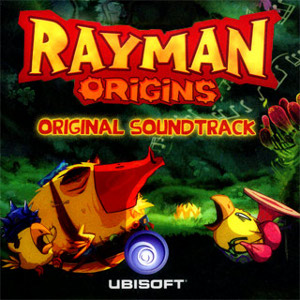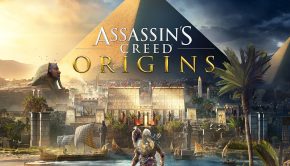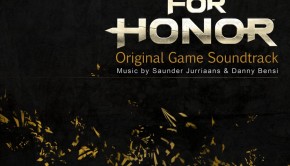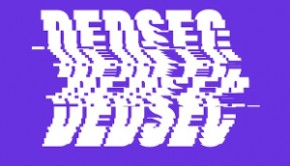Rayman Origins Original Soundtrack
 |
Album Title: Rayman Origins Original Soundtrack |
| Record Label: Ubisoft |
|
| Catalog No.: 300043457 |
|
| Release Date: November 24, 2011 |
|
| Purchase: Buy Used Copy |
Overview
Rayman Origins came as a surprise to me — both the game and the soundtrack. I was looking at this game solely for its art direction and not really for anything else. The art direction proved as stunning as expected: the colour palettes, the enemy design, the background design, and the character animations all just worked so well. To my surprise, the platforming gameplay is absolutely wonderful too, with precision and momentum both mattering. Surely if these two elements are astounding wonderful, something must be lacking. Perhaps the music?
Surprisingly not! Christophe Héral and Billy Martin composed an utterly charming soundtrack filled with diverse genres and silly melodies to keep players smiling throughout. The compositional quality is excellent and wonderfully arranged. I can’t get enough of the instrument representation in this soundtrack. The soundtrack is extremely well-produced as well, combining solo instrument performances (often from the composers themselves) with ensemble performances from the Macedonia Radio Symphononic. All of it leads to high musical quality and a downright amusing soundtrack leaving listeners feeling giddy with happiness. That said, the commercial soundtrack was only included in the limited edition European version of the game and isn’t complete. However, it’s still a solid listen.
Body
All who’ve played the game will know “The Tricky Treasure” extremely well. Right from the start, Héral establishes a unique feel for the soundtrack since he rejects traditional orchestral approaches in favour of an amusing folksy sound. The banjo and the fiddle just… make this. Though the track lasts for just one minute, it’s filled with diversity thanks to its swell banjo solo portions, bass and percussion breaks, and an utterly delightful brass fanfare finish. The “Shooting Me Softly” is utterly amusing kazoo evokes similar feelings, while the opening track “Lum King” keeps things light with its off-kilter guitar work and amusing chorus of the Lums.
Moving to the stage themes, I really enjoy how Héral maintained a consistent feel to all of Christophe Héral’s Jibberish Jungle themes. Expect plenty of percussion, didgeridoo, and jaw-harp in “A Slap-Happy Start” and Advancement”. Even the boss theme is consistent and features percussion heavily. It’s little touches like this that make me smile and nod with understanding. They aren’t the most exciting themes on the soundtrack, but their consistency certainly fits with the art style employed and gives the area a continuous feel. Moving to the Desert of Dijiridoos stage, “First Staffs” impressed me for its development. While it starts off extremely minimalistic, with its gentle marimba parts, it gradually adds more instruments and builds into a wonderful “symphony” of its own. The ethnic variation “Lost Beats” utilizes more frantic, harder-edged percussion, while woodwind and strings bring a wonderful catchy melody. Once again, it just fits and coordinates well with the level design and background art employed, and is an absolute joy to listen to both in and out of game.
Scored by Billy Martin, Gourmand Land employs flamenco, jazz and big band. For the icy portion of the level, “Glacier Cocktail” utilizes jazz, lounge themes and big band to a full extent. Given the level design, including limes you can jump on, cocktails and ice cubes littering the areas, straws that you can swing from,and oranges everywhere, it only seems fitting for acoustic guitars, woodwinds, and slower tempo themes to join in the fray. “Frozen Paradise” demonstrates this very well. But sometimes the areas call for something rapid, so “Breaking the Ice” supplies this with saxophones, strings, and guitars everywhere. This is also used as a transitional theme as the area shifts from a chill lounge area littered with cocktails to a fiesta taking place in the kitchen. The flamenco stylings is wonderful in these hot areas. “Waiting for the Waiter” is the slower theme, but I prefer “Hellish Paradise” with the castanets, guitars, and delightful vocals. Gourmand Land is just littered with wonderful music and it was a delight hearing all of it.
That said, the shining beacon of the album has to be the Sea of Serendipity stuff, featuring work from both artists. Providing you don’t have an aversion to cutesy jibberish vocals, “Lums of the Water” totally fits in with the background of swimming with thousands of fish looking for lums. It becomes so fun and delightful to sing along with the gibberish, listening to the wonderful jazz. The bright colour palette just becomes associated with this theme. “Swimming Against the Stream” kicks it up a notch with quick strings playing the melody from the previous track. It’s just a delight to hear an instrumental version that is adapted and performed so well. “The Abyss” tears the player away from the happiness of the lums and right into the darkness of the deep sea. It fits right in with the darker lit areas and sometimes the areas just lit by the player character. Its mysterious strings and percussion can be downright frightening, though Héral still manages to incorporate the lums motif to interesting effect. Sea of Serendipity all includes some fast percussion tracks from Martin too, namely “Panic at the Port” and “The Darktoon Chase”. They’re toe-tappingly catchy!
“Mystical Pique ~ The Fakir’s Song” communicates strength via its humming Lums, strong strings and wonderful underlying strings. It’s a shame that there’s only one version of it on the album proper, because the in-game variations are really nice since they take away some of the instrumentation to create unique pieces. The themes “The Mecha Factory” and “Nowhere to Run” round out the album quite nicely. “The Mecha Factory” plays during one of the final chase sequences of the main game, evocative of clocks and gears. The uptempo piano melody, strings and brass make for a very compelling chase theme. And “Nowhere to Run” sounds like one of those old western run and gun themes with the guitar and underlying strings in the background… then bringing up the fever with the trumpets and chorus. It’s so catchy and wonderful to hear as you’re running forward and dying repeatedly.
Summary
Overall, I had a ton of fun listening to this soundtrack. I have no trouble or hesitation with thinking that this is one of my favourite soundtracks in recent years. Monsieurs Héral et Martin should be extremely proud of their work and the effort they put into trying to coordinate with the background art, what’s going on in the background for proper theme transitions, and just the overall fun they obviously had with composing the soundtrack. Particular highlights include the instrumental variety and the vocal content, the fun and unexpected compositional flourishes throughout, and the varying genres throughout the soundtrack. I leave this soundtrack with a smile, and I urge listeners to give it a chance.
Do you agree with the review and score? Let us know in the comments below!
4.5
Posted on May 29, 2014 by Kimberly Singh. Last modified on May 29, 2014.














